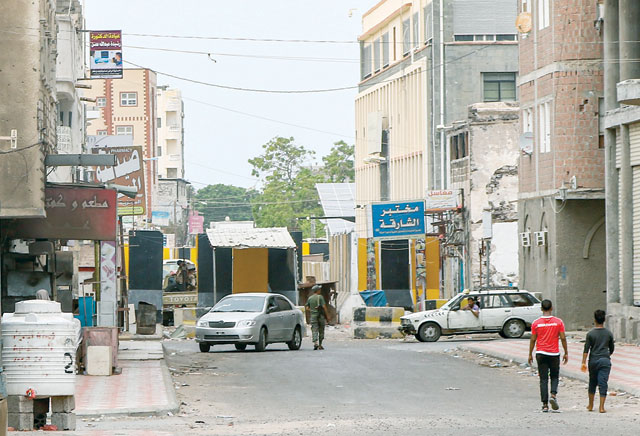ADEN — Southern separatists vacated key public buildings in Yemen's second city Aden on Saturday that they had seized from unionist forces loyal to President Abed Rabbo Mansour Hadi, his information minister said.
The supporters of the separatist Southern Transitional Council pulled out of the headquarters of Hadi's government, the supreme court and the central bank as well as Aden's main hospital, Muammar Al Iryani said on Twitter.
Hadi's government has refused to enter talks with the separatists until they withdraw from the positions they seized in deadly fighting last week.
Iryani said preparations were also underway for a pullout by the fighters — trained by the United Arab Emirates — from the interior ministry and the Aden oil refinery.
The start of the withdrawal had been announced by the Saudi-led military coalition which has been backing Hadi's government against northern-based Houthi rebels since 2015.
The UAE is Saudi Arabia's main partner in that coalition but trained and equipped the separatists as part of its efforts to consolidate control of the south.
The fighters of the so-called Security Belt forces last week ousted unionist troops loyal to Hadi from what was the capital of the formerly independent south in clashes that left around 40 people dead.
The Saudi-led coalition condemned the takeover of the city and urged the Security Belt to withdraw to clear the way for peace talks.
On Thursday, a joint Saudi-UAE military delegation travelled to Aden to discuss the details of a separatist pullback.
AFP journalists saw Saudi and Emirati military vehicles deployed around the positions vacated by the separatists on Saturday.
The presidential palace was also placed under Saudi and Emirati protection, they said.
‘Unite against Iran’
The coalition said in a statement Saturday that the positions occupied in Aden would be handed over to the government under coalition supervision.
Several other installations, including military camps, remain under separatist control and it was not immediately clear if they too would be vacated.
The coalition also called on all forces “to unite in order to foil Iran’s destructive plan in Yemen” and prevent attacks by extremist factions such as Al Qaeda and the Daesh group.
Saudi Arabia and the UAE have repeatedly accused Iran of supplying weapons, including ballistic missiles, to the Houthi rebels, an accusation Tehran has consistently denied.
The Yemeni embassy in Washington earlier this week Tweeted a foreign ministry statement welcoming the Saudi initiative to address the “coup” in Aden.
It said the separatists “must first commit to total withdrawal from areas forcibly seized by STC in past few days before start of any talks”.
The STC has accepted the call for peace talks.
South Yemen was an independent country until it merged with the north in 1990. An armed secession bid four years later ended in occupation by northern forces, giving rise to resentments which persist to this day.
Analysts say the break between Hadi’s government and the separatists reflects a wider rift between Riyadh and Abu Dhabi that threatens to undermine their common battle against the Houthis.
Despite four and a half years of military intervention by the coalition, the Houthi rebels remain in control of the capital Sanaa and much of the more populous north.
The rebels have also carried out a spate of cross-border missile and drone attacks targeting Saudi air bases and other facilities in recent months in what it says is retaliation for the Saudi-led air war in Yemen.
On Saturday the Houthis said they launched an attack on a gas installation in Saudi Arabia, using 10 drones.
Saudi energy giant Aramco later reported a “limited” fire at the Shaybah natural gas liquefaction facility, which it said caused no casualties or disruption to production.
Saudi Energy Minister Khalid Al Falih condemned what he described as “sabotage” and said “booby-trapped drones” were used in the attack.
